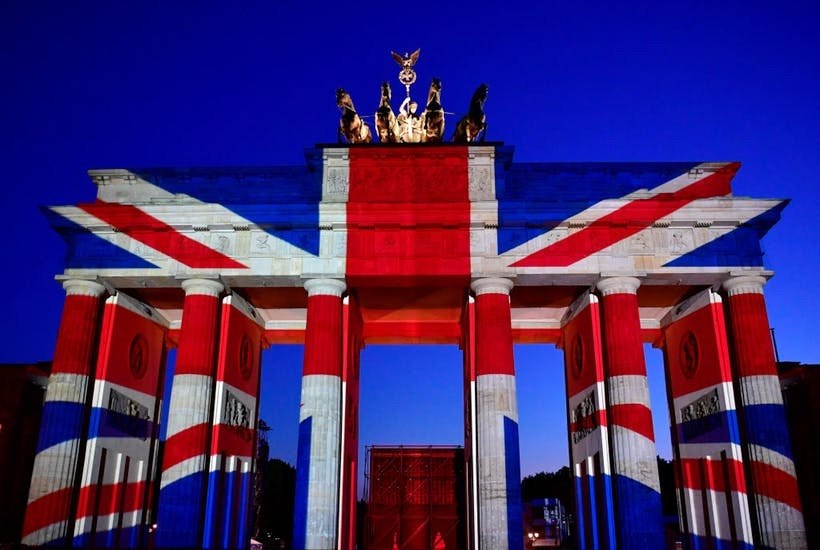Obscured by the hubbub of rolling news and the cacophony of Twitter, an important anniversary has passed by virtually unnoticed. The Berlin Wall has now been down for longer than it was up. Berlin’s ‘Anti-Fascist Protection Barrier’ (as the Communists used to call it) stood for 28 years and three months, from August 1961 to November 1989. It’s now been down for 28 years and four months. Its fall reunited the two Germanies, and changed the course of history. So, 28 years on, what can Brits learn from German Reunification? What lessons does the Wiedervereinigung hold for us today?
I filed my first report from Berlin in the first year of Reunification. Since then, I’ve returned to eastern Germany more times than I can count. My first visit provided me with conclusive proof (as if any further proof were needed) that state socialism was a truly terrible idea. West Berlin was thriving – East Berlin was a ghost town. Venturing out into the east German countryside, things were even worse: empty shops, derelict factories, nobody about… ‘All power to the Five Year Plan!’ read a faded slogan on an abandoned building. Here was a system so useless, it even made Germans lazy and inept.
Each time I’ve been back to eastern Germany things have been slightly better, and measuring those early trips against my most recent visits, the difference is immense. Dresden has been beautifully restored, Leipzig is a boom town, and even in the smaller towns the general infrastructure is often far superior to what you tend to find in equivalent conurbations in western Germany. But the biggest change has been the people. When I first ventured into eastern Germany, you could tell whether someone was a Wessi (West German) or an Ossi (East German) from a hundred yards away. It wasn’t just their clothing, or their complexion – it was their overall demeanour. Even from a distance, they looked fearful and downtrodden. Now, for virtually anyone under fifty, it’s impossible to tell Wessis and Ossis apart.
East Germany is still poorer than west Germany, and will probably remain so, but the economic gap is now no greater than the gap between Northern and Southern Italy, or Northern and Southern Spain – not bad for a place where private enterprise used to be virtually illegal. In 1991, when I first went east, east German GDP was below €10k per capita, compared to over €20k in the west. East German GDP is now around €28k per capita. Sure, that’s still way behind west German GDP (about €40k) but east Germans now earn 70 per cent of western salaries. It used to be less than half.
Inevitably, these improvements have come at a colossal price to the west German taxpayer. Reunification has cost well over a trillion Euros so far, and the meter is still ticking – at around 75 billion Euros per year. Unemployment remains twice as high in eastern Germany as it is in the west – around 10 per cent in the east, compared to 5 per cent in western Germany. Far from creating a Fourth Reich, eager to dominate the rest of Europe, Reunification is a Herculean task which will preoccupy the Germans for generations.
So was it worth it? Well, that depends on who you ask. ‘Ostalgie’ (nostalgia for the former GDR) is largely confined to old age pensioners, but it’s telling that in last year’s election, Alternative für Deutschland was almost twice as popular in eastern Germany (nearly 22 per cent) as it was in western Germany (around 11 per cent). The difference in votes for Die Linke was even more pronounced: over 16 per cent of east Germans voted for Germany’s hard left party, compared with a mere 7 per cent of voters in the west. Disenchantment isn’t confined to impoverished east Germans. AfD polled strongly in Bavaria, one of Germany’s richest states. So does German Reunification hold any clues for the challenges that face Great Britain – not least Brexit, and the quest to revive the industrial heartlands of northern England?
Of course Germany’s Wiedervereinigung is unlike Brexit in almost every way, but one big thing they have in common is that they’re both patriotic projects, where economic considerations come second to a shared sense of nationhood. There was nothing inevitable about Germany Reunification. Mitterand was fearful, and Margaret Thatcher was dead against it. Without the decisiveness of Helmut Kohl, and the resolute support of George Bush Senior and Mikhail Gorbachev, it never would have come about.
Even the geography of Reunification was a triumph of emotion over logic.Eastern and western Germany had been one nation before the war, but that nation also included Silesia, East Prussia and Eastern Pomerania – integral parts of Deutschland that are now lost forever. Culturally, it’s just as hard to make a case for the intrinsic hegemony of today’s Bundesrepublik. Catholic Bavarians have far more in common with Catholic Austrians than they do with Protestant east Germans. For Rhinelanders, eastern Germany is more distant (and alien) than Strasbourg or Luxembourg. The Swabians of south west Germany are closer to the German speaking Swiss.
And yet you only had to see the celebrations when Germany was reunified in 1990 to know that this was something people felt, rather than something people thought – a victory of the heart over the head. Two Germanies might have worked perfectly well, but it wasn’t what the people wanted. And so the Bundesrepublik set out on an unfamiliar path, at vast expense, towards an unknown destination. Twenty eight years later there’s still a long way to go, and no knowing where they’ll end up. The irony is that for Germany, EU membership enabled this patriotic project, rather than suppressing it. But then Germany and Great Britain have always been worlds apart.


















